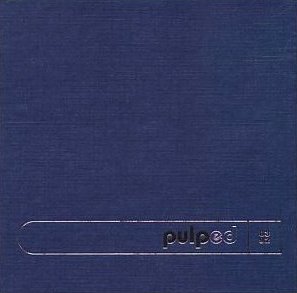Pulped 83-92 (box set)

Details
- Release date: 31 May 1999
- Label: Cooking Vinyl
- Format: 4 CD box set
- Catalogue number: COOKCD178
Sleevenotes
One of the reasons why Pulp are regarded with so much affection is that it took them so long to make it. They date back to 1978 when Cocker was a 15 year old Sheffield schoolboy. 'I'd always wanted to be in a group - I'd walk around school imagining I was in one,' he once said. The name he chose for his group was Arabacus Pulp; history does not record why, or even when they dropped the first word. The original lineup, apart from our man, was Mark Swift on drums, Peter Dalton on guitar and a bassist called Fungus. Their first gig was at the Rotherham Arts Centre, circa 1980, where their set - Jarvis was into Echo And The Bunnymen and The Teardrop Explodes - failed to enchant the crowd.
Band membership had already changed several times between formation and their first gigs, and continued to do so. People came and went. One bassist was sacked because he wanted to lie down (onstage) between numbers, while Dalton's father forced him - by dint of throwing a plate of food at him - to quit and go to university. Simon Hinkler, later of The Mission, played keyboards for a while. Today's Pulp - Jarvis, keyboardist Candida Doyle, guitarists Russell Senior (1) and Mark Webber, bass player Steve Mackey and drummer Nick Banks (nephew of footballer Gordon) - didn't materialise until mid-1994.
In the meantime, they got their first John Peel session, for which they used homemade equipment, had their first bit of press (in Melody Maker) and had their first record release, a track called What Do You Say? which appeared on an indie compilation.
The first mini-album, 'It' came out on Red Rhino Records in April, 1983. The quiet, almost acoustic, music was a far cry from what was to come, but Jarvis' dramatic-verging-on-lugubrious singing style was already well-developed. That's his sister, Saskia, singing back up on the lovely Blue Girls (which appears here with two other It numbers, My Lighthouse and Wishful Thinking).
Several singles followed; tracks featured and included here are Little Girl (With Blue Eyes) (which, says Jarvis, is about his mother, who had to give up college and get married when she became pregnant with him), Blue Glow, Dogs Are Everywhere and Mark Of The Devil.
The next album, Freaks (on Fire Records), didn't appear till 1987. Its, well, freakish content (songs about fairground sideshows and being pursued by murderous villains) was quite some progression. Being Followed Home evokes the terror of walking alone down the streets of a seaside town, menacing footsteps close behind. Equally dramatic are I Want You, Master Of The Universe, Don't You Know and They Suffocate At Night.
Though Freaks met with critical acclaim, the public were vastly indifferent. Hence in 1988 Cocker moved to London to do a film course at St Martin's School of Art, and didn't get around to the next album, Separations, until 1992. By this time. Pulp had arrived at the sound we recognize today, ie, sleek and sexy, yet dominated by Jarvis's mock-Barry White croon. The single My Legendary Girlfriend was almost a hit, making number 23 on the NME's Best Singles of the Year poll. Yet Pulp weren't quite there, and they'd hovered at the edge of 'there' for so long, they were becoming discouraged. But dawn was about to break...
- Caroline Sullivan (The Guardian)
- Most of these sleevenotes are copied straight from the Countdown 1992-1983 compilation.
- (1) Russell Senior left the band over 2 years before this compilation was released.
Reviews
(3/5)
Teething Troubles
The first four albums, in one handy cardboard box.
AS EVERY SCHOOLBOY knows, Pulp's gestation period made even the tardiest of elephants seem sprightly. It took 17 years for the band Jarvis Cocker named Arabacus Pulp, after a commodity he'd heard about in an economics lesson, to become the louchest torch-bearers of Britpop. Pop archaeologists can now pore over this box set comprising the four albums Pulp released before entering the popular consciousness with His 'n' Hers in 1994.
Formed in 1978, Pulp had already undergone one major line-up overhaul when they recorded 1982's It. A plaintive, largely acoustic affair, it's actually rather sweet, if very of its time, and studded with odd gems like Joking Aside where the tone of Cocker's tenor suggests that at least the younger Morrissey was listening.
There followed a raft of overlooked independent singles such as the excellent Little Girl and the slight but loveable Dogs Are Everywhere. These, along with much other flotsam, were later released on Fire's compilation Masters Of The Universe, which is included here. The high spot is 97 Lovers, Cocker's macabre, funny tribute to his aunt ("I know a woman with a picture of Roger Moore in a short towelling dressing gown pinned to her bedroom door"). It contrasts sternly with The Will To Power, either a fey joke or an artistic experiment; either way it's vile.
1987's Freaks shows signs of the emergent Pulp style - Candida Doyle was installed on keyboards - but is frankly too lugubrious and grotesque to trouble anyone but completists.
Five years later Cocker was studying film in London and making Separations, to all intents and purposes the first real Pulp album in the modern sense. All the elements are in place: the glitzy, moth-eaten, camp takes on Nick Cave and Scott Walker, Cocker's sleazy, breathless spoken narratives and a selection of terrific tunes of which My Legendary Girlfriend is arguably still unsurpassed.
They weren't to know but they were about to become pop stars; somewhere in Hollywood Michael Jackson was waking up in his oxygen tent with Bubbles.
Notes
The booklet contains lyrics for Freaks and Masters of the Universe only. However, the lyrics for Master of the Universe are for the original version, not the sanitised version.